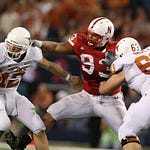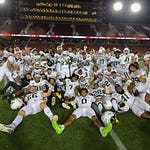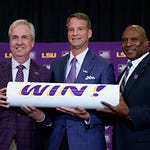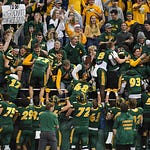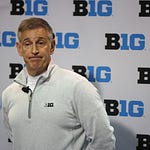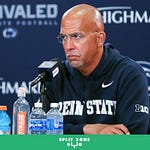On February 19, I published a report in Slate Magazine about Nick Saban’s prospects in a United States Senate campaign. I had become aware of a private YouGov poll that tested Saban against Tommy Tuberville in the 2026 Senate race in Alabama, and the numbers were catchy. Saban was more or less tied with Tuberville, leading 42-39 in a poll with a 5 percent margin of error.
That was a testament to Saban’s popularity, with 81 percent of registered voters attesting to a favorable view of the now-retired Tide coach. The poll tested Saban as a Democratic candidate, in a state where Democrats basically never win statewide office.1 His polling strength is a newsworthy finding after years of pure speculation about how Saban might do in a political campaign. Someone actually tested it, and that Saban is so popular can tell us some things about him and the state where he’s coached ball for the past 17 years.
There are barriers, though. One is that Democrats would need to convince Saban to run. He’s never shown any interest in a campaign, and his agent didn’t respond to my questions about whether Saban had ever considered it or which party he’d run with if he ever did. (Most people seem to think Saban is a quiet, centrist Democrat, owing to a few points in his biography and past statements.) Two is that Saban would instantly become less popular in Alabama when he became a Democratic politician. And three is that Alabama’s straight-ticket voting option renders candidate individuality relatively unimportant. Saban would be an enormous underdog if Democrats could ever convince him to run. The best case is that he’d make an impossible task into a very unlikely one.
But the polling data demonstrates something else: It quantifies just how large Saban looms in the public conscience in Alabama. And that part of the story is its own interesting dimension. Matt Scalici is an Alabamian journalist who covered both Auburn and Alabama during Saban’s reign. He is now the audience development editor at For The Win and co-host of a sports and pop culture podcast, For The Watercooler. He joined me to talk about Saban’s cultural power in Alabama, why he’s skeptical it would work out if applied to electoral politics, and what Saban might actually do now that he’s no longer the Tide’s head coach but will theoretically remain involved with the program he built.
Production: Anthony Vito
Doug Jones won a Senate race in 2017, so I meant to say Democrats “basically” rather than “literally” never win statewide elections. All it took for Jones to win was for him to be up against a candidate facing several sexual abuse allegations in a special election without other Republicans on the ballot.






